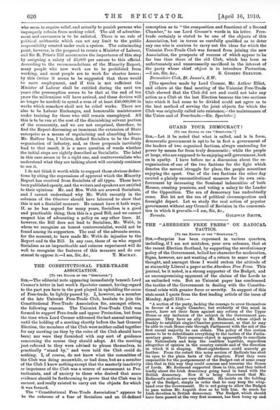THE CONSTITUTIONAL FREE-TRADE ASSOCIATION.
[To THE EDITOR OP THE " SPECTATOR." J
SIR,—The editorial note appearing immediately beneath Lord Cromer's letter in last week's Spectator cannot, having regard to the part you have in the past played in upholding the cause of Free-trade, be lightly passed by. I, however, as a member of the late Unionist Free-Trade Club, hesitate to join the Constitutional Free-Trade Association for, amongst others, the following reasons. The Unionist Free-Trade Club was formed to support Free-trade and oppose Protection, but from the time when Lord Cromer addressed the last annual meeting until the holding of a meeting shortly before the last General Election, the members of the Club were neither called together for any meeting (as they by the rules of the Club should have been) nor were they furnished with any sort of guidance concerning the course they should adopt. At the meeting just referred to they were advised to please themselves, to practically " stand by," and were told the Club could do nothing. I, of course, do not know what the committee of the Club was doing meanwhile, or bad done, but as a member of the Club I knew nothing except that the masterly inactivity or impotence of the Club was a source of amusement to Pro- tectionists, and of anxiety to those who desired that some evidence should be forthcoming to prove that the Club was in earnest, and really existed to carry out the objects for which it was formed.
The " Constitutional Free-Trade Association" appears to be the outcome of a fear of Socialism and an ill-defined conception as to " the composition and functions of a Second Chamber," to use Lord Cromer's words in his letter. Free- trade certainly is stated to be one of the objects of this Association, but in terms so carefully qualified as to deter any one who is anxious to carry out the ideas for which the Unionist Free-Trade Club was formed from joining the new Association, the prospects of success of which appear to be far less than those of the old Club, which has been so unfortunately and unnecessarily sacrificed in the interest of the party whose chief object is to introduce Protection.
[The speeches made by Lord Cromer, Mr. Arthur Elliot, and others at the final meeting of the Unionist Free-Trade Club showed that the Club did not and could not take any action as a Club at the last Election because the two sections into which it bad come to be divided could not agree as to the best method of serving the joint objects for which the Club was originally called into existence,—the maintenance of the Union and of Free-trade.—En. Spectator.]














































 Previous page
Previous page